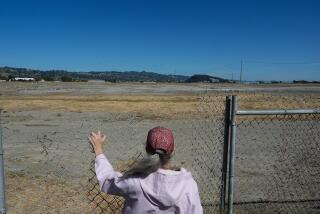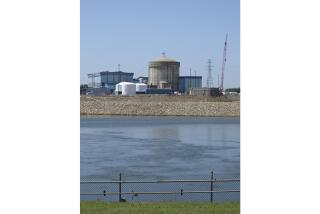Nuclear Tank Facility Called Public Danger
- Share via
WASHINGTON — A hydrogen explosion or an earthquake could release radioactive liquid wastes from storage tanks at a government nuclear weapons facility in South Carolina, eventually leading to thousands of cancer cases, an environmental group charged Wednesday.
The Environmental Policy Institute released a five-year study of 14,000 reported accidents, spills and equipment failures at the Energy Department’s Savannah River Plant near Aiken, S.C., which is situated in an area that the U.S. Geological Survey considers vulnerable to major earthquakes.
The group charged that the facility’s “tank farm,” where the liquid waste is stored underground, poses a risk of a disaster approaching the magnitude of the accident earlier this year at the Soviet Union’s Chernobyl nuclear power plant.
Cites Leaks From Tanks
The report said that leaks from the tanks and dumping at the plant’s site already have made the area dangerous to workers and uninhabitable to humans for thousands of years.
“We’re dealing with some of the most dangerous material ever conceived of,” said Brent Blackwelder, vice president of the institute, a private research organization. “And yet the way it has been handled can be best described as casual and cavalier.”
The Savannah River Plant, which began operating in 1953, produces weapons-grade plutonium. Built and operated by Du Pont, it is similar in design to another Du Pont facility, the N reactor in Hanford, Wash. Both generate liquid radiation waste and store it in underground tanks.
Energy Department spokesman Dave Devane declined to comment on the report’s specifics, saying that officials have had little time to review it. But he denied that the Savannah River Plant poses any public danger.
Defends Storage Practices
“That waste is being stored in a way that is very safe,” Devane said, adding that the government plans eventually to solidify the liquid waste, encase it in glass and store it in a repository.
As many as 20,000 cancer cases could result from a hydrogen explosion, which might occur if ventilation and filtration in any of the plant’s 51 tanks fail, allowing a buildup of the highly flammable gas, said Dr. Arjun Makhijani of the environmental group.
A buildup of hydrogen “could cause an explosion severe enough to destroy the tank and send millions of curies of radioactive waste spewing into the air and onto the land. Such an accident could cause up to 20,000 cancer cases in addition to genetic damage and other ill-health effects. In addition, a very large area of land would have to be written off essentially forever,” the report said.
Criticizes Poor Records
Devane, however, called that assessment “overstated.”
But Makhijani said plant managers cannot be sure that a hydrogen blast will not occur, contending that poorly maintained records of mechanical failures at the plant are a poor statistical base on which to assess risk.
The institute’s report also expressed fear that an earthquake could bring about contamination of an aquifer providing irrigation and drinking water to parts of Florida, Alabama, South Carolina and Georgia.
More to Read
Sign up for Essential California
The most important California stories and recommendations in your inbox every morning.
You may occasionally receive promotional content from the Los Angeles Times.













